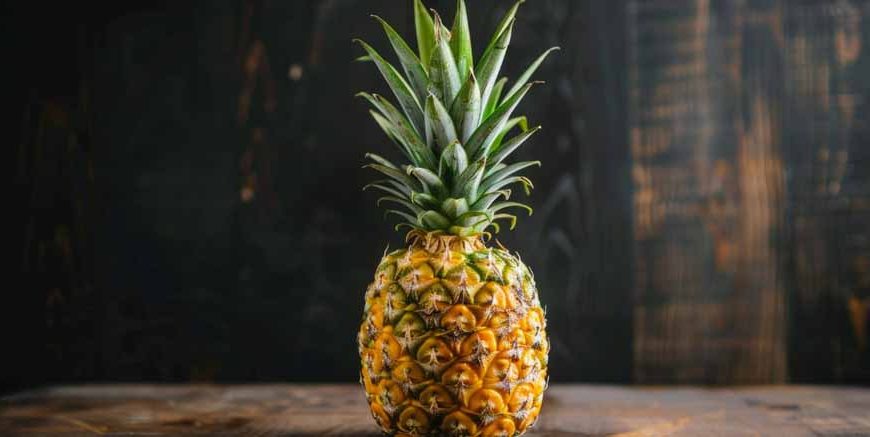It is a blisteringly hot summer afternoon, and the neighbouring kids are engrossed in a game of cricket. As soon as the game ends, they run for the fruitwala nearby. After all, it is the right time to bite into those yummy pineapples! Aahh… The cooling taste refreshes them and provides essential nutrients to take on the summer sun!
Parents, you know Pineapples are tasty treats for children. But did you know that they are also a nutrition powerhouse? The nutritional benefits of pineapple cannot be overstated.
Nutritional Benefits of Pineapple
Vitamin C: Essential for a robust immune system and healthy skin. Manganese: Supports bone health and boosts metabolism. Dietary Fibre: promotes good digestion and prevents constipation. Bromelain: An enzyme that aids in protein digestion and helps reduce inflammation. Now you know why adding pineapple to your child’s diet now and then can make a big difference in their overall health!
Health Benefits of Pineapple Juice
The health benefits of pineapple juice just cannot be overstated! Apart from being packed with nutrients, there are many more reasons why drinking pineapple juice can benefit your kids’ health drastically. It is one way through which they can get all the required vitamins daily while enjoying its sweet taste simultaneously, thus making them feel good about themselves, too. Below are a few major advantages associated with the consumption or use of pineapple juice for children :
Boosts Immunity – This kind of juice has high levels of Vitamin C, which boosts the body’s immunity system against diseases such as colds, among other common infections; hence, it should be given frequently during such seasons when these ailments are prevalent, especially among young ones who have weaker immune systems than adults. While the fruit itself already contains various healthy substances, juices made out of fruits are even more beneficial because all necessary elements needed by growing bodies get absorbed into the bloodstream faster without much difficulty, unlike chewing solid food and then waiting for the digestion process to finish before nutrients can finally be distributed throughout whole organism thus making them readily available where they required most. This also means that such beverages provide an instant energy boost, vital for kids who often become tired quickly or lose interest in doing things due to insufficient strength.
Aids Digestion – It is important to note that pineapple juice contains bromelain enzymes, which aid digestion and break down proteins so that they can easily be absorbed into the body’s system. Hydration – During summer months, especially those experienced within the Indian subcontinent, children should take plenty of fluids like water but if it becomes monotonous, then pineapple juice will do just fine since apart from quenching their thirsts , this particular drink also helps keep them cool thereby preventing dehydration.
Anti-inflammatory Properties: The bromelain enzyme has been found through scientific research done over the years to possess anti-inflammatory properties and act as a natural painkiller, hence reducing swelling around inflamed areas caused by injuries or infections. Therefore, giving your child some pure pineapple juice when he /she complains about having sore muscles after playing too hard outdoors may alleviate discomfort and speed up healing.
Fun and Fruity Pineapple Recipes for Kids
Tropical Twist Smoothie: For a wonderfully cool breakfast or snack, blend together ripe pineapple chunks, creamy yoghurt, a ripe banana, and a dash of tart orange juice.
Pineapple Cheese Kebabs: Thread skewers with alternating sweet pineapple chunks and mild paneer cheese. Grill to perfection and watch the smiles appear!
Cool Pineapple Pops: Blend up a tropical storm with pineapple chunks and coconut water. Freeze in popsicle moulds for a healthy treat that will keep them cool.
Pineapple Yoghurt Delight: For a zesty side dish that goes well with any dinner, mix pineapple pieces with yoghurt, a dash of salt, and a touch of toasted cumin powder.
Chopped pineapple can be added to your favourite oatmeal cookie recipe to make chewy pineapple oatmeal cookies. These cookies are the ideal sweet treat because they are healthy and full of nutrients.
Sunshine Fried Rice is a tasty and nutritious dish that is visually appealing as well as nourishing. It is made by sautéing cooked rice with colourful pineapple pieces, peas, carrots, and a drizzle of soy sauce.
Those are some fun and easy pineapple recipes for kids that you can try at home 🙂
Benefits of Pineapple for Kids
The advantages of consuming pineapples go beyond their nutritional value alone because they have other merits, too. Below are some extra reasons why you should make sure that your child eats them regularly:
- Promotes Healthy Skin:
- Supports Eye Health:
- Strengthens Bones:
- Improves Oral Health:
- Boosts Energy Levels:
Collagen is produced by vitamin C, which is abundant in these fruits. This aids skin healthiness, keeping it soft and radiant for kids.
Beta-carotene and Vitamin A in such foods play vital roles in maintaining good eyesight among young people and preventing eye-related problems from occurring later in life.
Manganese, which can be sourced from pines, is known to enhance solid bone formation, thus making bones stronger. It also promotes the general growth process among children.
This fruit has natural antibacterial properties, helping keep mouths clean while preventing cavities and gum diseases, especially when consumed regularly over time by kids.
These organic sugars offer instant bursts of energy necessary for continuous activities undertaken by active growing children who require constant power supplies throughout their daily routine without getting tired quickly afterwards.
Encouraging Kids to Eat Pineapple
Children may sometimes not readily accept new types of foods. Nevertheless, there are several ways you can employ to make them love eating pineapples, as follows:
Make it Fun: When preparing snacks for children, use pineapple slices of different shapes or sizes. This may arouse curiosity among kids, thereby motivating them to try such food items without much resistance from the onset.
Pair with Favourites: Combine their preferred dishes with this tropical fruit. For example, mix yoghurt with some pieces of pineapple or even put more on top of the cereals that they like most often.
Involve Them in Cooking: Allow your little ones to assist while cooking pineapple meals at home. This will create excitement around trying something prepared jointly, thus increasing the chances of success during subsequent tasting sessions, too.
Educate Them: Discuss the merits of eating these fruits and let them understand how important it is for their well-being. Sometimes, knowledge alone might work wonders, especially when dealing with stubborn eaters who always ignore any new thing suggested by adults around them.
In Conclusion
Adding pineapples to a child’s diet serves two purposes: one being delicious and second providing essential minerals & vitamins required by growing bodies. From boosting immunity systems up to enhancing skin textures, there are countless benefits attached to such fruits when consumed regularly among kids, irrespective of whether done through making juices out of these or using other creative methods intended mainly for our little ones’. At EuroKids, we believe that balanced diets + healthy living habits = happy childhood. Hence, our specially crafted curriculum incorporates these aspects together to achieve overall growth development outcomes.















